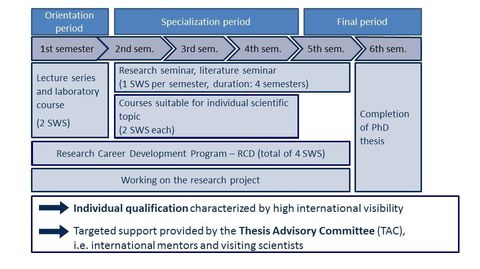Qualification Program
The qualification program being an integral part of the RTG comprises the following three main topics:
Table of contents
1. Study program
Our study program aims at providing both PhD students funded through the DFG as well as associated doctoral candidates with the opportunity to gain in-depth knowledge in the various topics of the Research Training Group, i.e. elastomer materials science, textile technology, lightweight engineering, control technology, numerical simulation, sensor/actuator networks, thermodynamics as well as material and component testing. Thus, all researchers will be enabled to develop skills and competencies that are required to accomplish the ambitious complex and interdiciplinary tasks. Our study program is designed to meet the specific requirements of the RTG topics; scientific teaching contents will be conveyed in a condensed manner by experts in the particular field.
Working language of the RTG will be English to facilitate the recruitment of excellent international graduates. Therefore, foreign PhD candidates can easily be integrated into the RTG and will be well prepared for an international scientific career by the end of their research period. Additionally, they will able to communicate and discuss ideas and opinions in an international context.
The study program will be structured according to the following illustration:
2. Visiting scientists and Mercator fellows
Within the RTG, a variety of research areas with international relevance will form a closely interlinked structure. For this purpose, international scientists will be invited to generate an international discourse on current research results. Visiting scientists will contribute profound expertise by holding lectures and seminars as integral part of the planned lecture series and research seminars. During their stay at TU Dresden, these scientists will be available to our PhD candidates for in-depth advice and cooperation talks (for example in terms of a potential international research visit).
This is a list of all designated visiting scientists:
| Prof. Vladan Koncar | ENSAIT, Roubaix, Frankreich |
| Prof. Kanji Kajiwara | Shinshu University, Nagano, Japan |
| Prof. Song Lin | Tongji University, Shanghai, China |
| Prof. Jyrki Vuorinen | Tampere University of Technology, Tampere, Finnland |
| Prof. Olga Solcova | Institute of Chemical process Fundamentals of the ASCR, Prag, Tschechien |
| Prof. Rajamani Krishna | Fac. of Science, Univ. Amsterdam, Niederlande |
| Prof. Yurij Raikher | Russian Academy of Sciences, Perm, Russland |
| Prof. Elena Kramarenko | Lomonosov Moscow State University, Russland |
| Nikhilesh Chawla | Arizona State University, USA |
| Prof. Jason Geathers | The Citadel, The Military College of South Carolina, Charleston, SC, USA |
| Ass. Professor Iain Alexander Anderson | Auckland University, Neuseeland |
| Prof. Jules Magda | University of Utah, USA |
| Prof. Jacob Fish, Prof. WaiChin Sun | Columbia University, New York, USA |
| Prof. Alan Lynch | University of Alberta, Kanada |
3. International research visit
All PhD candidates will be encouraged to complete at least one international research visit during their research period at the Research Training Group. Since a stay at an international research institute is an integral part of our research and qualification program, it will not extend the PhD period. Therefore, an international mentor was added to the support concept, who will complement the two other mentors and provide further scientific advice and supervision to PhD students during their research visit abroad. In close collaboration with the main mentor, the international mentor will ensure that the PhD candidate receives the required equipment and appropriate assistance. In addition, he/she can act as external mentor in the PhD procedure, provided that intense personal support can be guaranteed, for example through email or phone. Typically, subproject managers will later be reviewers in the PhD procedure.
Currently, the following renowned professors have declared their commitment to act as mentor for our RTG:
- Prof. Vladan Koncar, ENSAIT, Roubaix, Frankreich
- Prof. Kanji Kajiwara, Shinshu University, Nagano, Japan
- Prof. Song Lin, Tonji University, Shanghai, China
- Prof. Jyrki Vuorinen, Tampere University of Technology, Tampere, Finnland
- Prof. Olga Solcova, Institute of Chemical process Fundamentals of the ASCR, Prag, Tschechien
- Prof. Yurij Raikher, Russian Academy of Sciences, Perm, Russland
- Prof. Nikhilesh Chawla, Arizona State University, USA
- Ass. Professor Iain Alexander Anderson, Auckland University, Neuseeland
- Prof. Jules Magda, University of Utah, USA
- Prof. Jacob Fish, Prof. WaiChing Sun, Columbia University, New York, USA
- Prof. Alan Lynch, University of Alberta, Kanada


